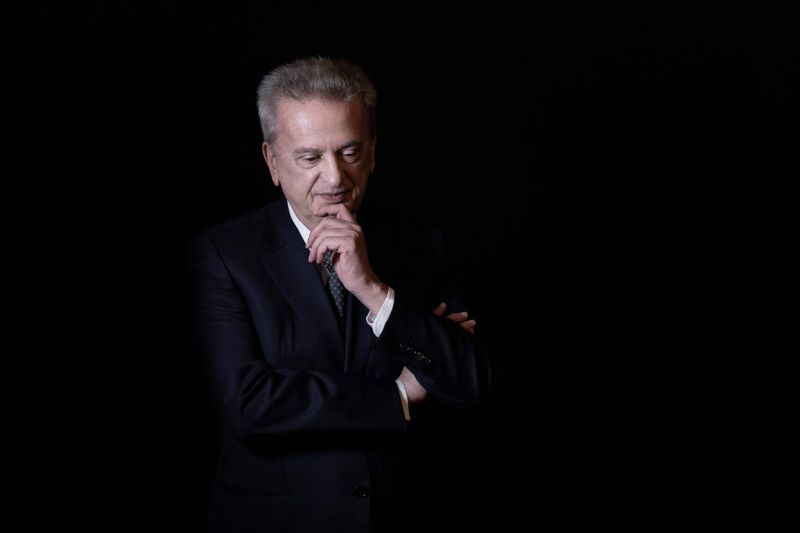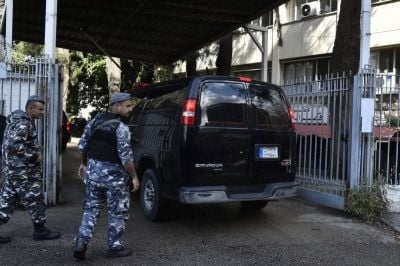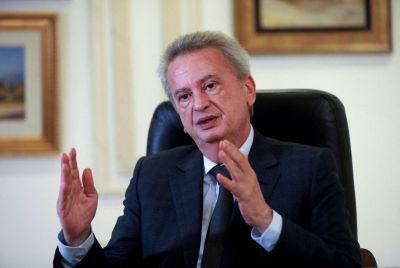
A file photo taken on December 20, 2021 shows Lebanon's Central Bank governor Riad Salameh posing during a studio photo session in Beirut. (Credit: Joseph EID / AFP)
The Paris Court of Appeal will debate on Tuesday the validity of a large number of seizures made on the real estate and banking assets in Europe of the governor of Lebanon's central bank, Riad Salameh, who is suspected of having acquired them through massive misappropriation of Lebanese public funds.
Interviewed in Beirut in mid-March by several European judges investigating him, including the French investigating judge Aude Buresi, Riad Salameh, 72, maintained his innocence, as he has done since the opening of the case.
At the end of March 2022, France, Germany and Luxembourg announced the freezing of 120 million euros of Lebanese assets linked to the man who has headed Banque du Liban since 1993 and four other people.
On Tuesday, from 2 p.m., the Parisian investigating chamber will debate the requests made by the Salameh camp for the restitution of more than a dozen different seizures made by France, including apartments in the 16th arrondissement of Paris and on the Champs-Elysées.
The decision on these assets, the value of which is in the tens of millions of euros, should be known within a few weeks.
The Public Prosecutor's Office has asked for confirmation of the seizures, expressing concern that, in the event of a possible judicial conviction, France would be deprived of "any prospect of confiscation" of the assets.
The stakes are high, says a source close to the case: "To hit [Riad Salameh] in the wallet is the main concrete action possible in this case," since Lebanon refuses to extradite its nationals and tries them on its soil if they are convicted abroad.
William Bourdon, lawyer for two civil parties, the NGO Sherpa and the Collectif des victimes des pratiques frauduleuses et criminelles au Liban (CPVCL), also asks for confirmation of these seizures, "based on very powerful evidence."
"The requests for release are as much a rearguard battle as a communication operation," Bourdon added.
Company in the Virgin Islands
The French judicial inquiry, the existence of which was revealed by AFP, has been running since July 2021, in parallel with other European and Lebanese investigations.
According to investigation documents of which AFP has been informed, the embezzlement scheme in question is based mainly on a company registered in the Virgin Islands, created in 2001 by the Mossack Fonseca firm, implicated in the Panama Papers.
Forry Associates Ltd, whose economic beneficiary is allegedly Raja Salameh, the governor's brother, was authorized by Banque du Liban, headed by Salameh, to trade Lebanese treasury bills and eurobonds for a commission.
This commission was then allegedly transferred to Swiss bank accounts belonging to Raja Salameh, who subsequently returned "more than $220 million to several personal accounts in Lebanon," including some belonging to Riad Salameh.
Riad Salameh told the Lebanese justice system in August 2021 that he had received money from his brother to pay off a $15 million debt dating back to the 1990s.
Again recently, the French justice system was concerned about "difficult, if not impossible" obstacles: It is Riad Salameh who, as governor of the BDL, chairs the Banking Control Commission, the Lebanese body in charge of lifting banking secrecy, which has been asked to authorize the disclosure to the justice system of the transaction records of the Lebanese bank accounts of Raja Salameh and Riad Salameh.
At this stage, in France, he is not formally implicated, unlike one of his close friends, Anna K., a 46-year-old Ukrainian woman who was indicted in June 2022 on suspicion of having contributed to "complex financial arrangements to conceal the origin of the funds embezzled by Riad Salameh to the detriment of the Lebanese bank … and the final beneficiary of the funds."
According to several sources, Judge Buresi would like to interview Salameh in France in mid-May, but it is not certain that Lebanon will allow him to fly.
His lawyer, Pierre-Olivier Sur, argues that the French investigation could collapse because of irregularities: he points to Salameh's hearing as a "simple witness" in mid-March in Lebanon while the French penal code "strictly prohibits hearing" under this status "a person against whom there are "serious or concordant evidence" of participation in the offense" in question.
This article has been translated from the French text published by AFP.

